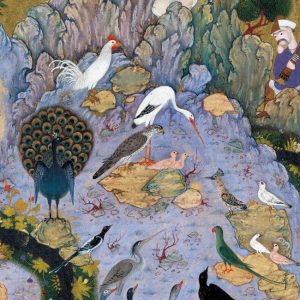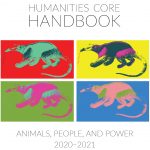
This quarter, we explore how animal figures have been used to understand what it means to be human. By tracking beasts through ancient tales, medieval manuscripts, and Renaissance drama, what can we learn about the politics and belief systems of the premodern world? Do our ideas of a “natural” hierarchy inform the power structures of our social world, or vice versa?
Animals, People, and Power
What is an animal? How much of what we know about the natural world actually comes from reality, and how much is a projection of human concerns onto other living things? When we represent animals in art, literature, or scientific discourse, what kinds of boundaries between “humanity” and “animality” are drawn? Why are those boundaries so often transgressed or transformed? What kind of cultural or political work is performed when we compare animals to people, or people to animals?
Fall quarter’s lecturing faculty from the departments of English and Comparative Literature will lead students in readings of classics from Europe and the Middle East, including the fables of Marie de France, Kalilah wa Dimnah, the mystical poetry of Attar, and major works by Ovid, Chaucer, Shakespeare, and Zakani.
In seminar, students will be guided through the transition between high school and college-level writing and communication. They will build a basic website for ongoing multimodal projects, conduct a rhetorical analysis of a medieval animal fable, and write a literary analysis of A Midsummer Night’s Dream.
Writing
Prompts
Research
Help
Writing
Center
UCI
Support
LECTURING FACULTY
Prof. Rebecca Davis (Dept. of English)
Prof. Julia Lupton (Dept. of English)
Prof. Nasrin Rahimieh (Dept. of Comparative Literature and Humanities Core Program)
REQUIRED MATERIALS F2020
Important: The course requires the specific editions and translations listed below, and students need to account for the possibility of shipping delays from the bookstore.
 Beauchamp, Tamara, ed. Humanities Core Handbook 2020–2021. XanEdu, 2020. ISBN: 9781711493381 [Available only through UCI’s bookstore, for use in all three quarters of the course]
Beauchamp, Tamara, ed. Humanities Core Handbook 2020–2021. XanEdu, 2020. ISBN: 9781711493381 [Available only through UCI’s bookstore, for use in all three quarters of the course]
Marie de France. Fables. Translated and edited by Harriet Spiegel. University of Toronto Press, 1994. [Either print book (ISBN: 9780802076366) or e-book (ISBN: 8220116326050) is acceptable.]
Ovid. Metamorphoses. Translated by Rolfe Humphries. Annotated by Joseph D. Reed. Indiana University Press, 2018. [Either print book (ISBN: 9780253033598) or e-book (ISBN: 9780253034496) is acceptable.]
Shakespeare, William. A Midsummer Night’s Dream. Edited by Wolfgang Clemen. Signet Classics, 1998. ISBN: 9780451526960
FALL 2020 LECTURE CALENDAR
Students in Humanities Core enroll in a lecture and in a corresponding writing seminar. The prerecorded lecture videos (two per week) will be accessible through the UCI Canvas site for lectures, and each writing seminar will have a UCI Canvas site with a seminar syllabus. All Canvas course spaces can also be accessed through EEE+ GrandCentral.
The following calendar (subject to change) provides information about the lecturing faculty, readings for lectures, and special events. The reading assignment for each lecture should be completed before the lecture. Links for PDF readings are available on the seminar syllabus in Canvas.
| Date | Lecture | Readings | Events | |
| Wk 0 | ||||
| 10/1, 10/2 2020 |
No lectures this week, but seminars do meet: TuTh seminars meet for the first time on Thursday, 10/1, and MWF seminars meet for the first time on Friday, 10/2. HumCore BioSci discussions begin in Week 1. |
Beauchamp, “Critical Thinking in Humanities Core,” Humanities Core Handbook (pp. 11–20) [single-chapter PDF for those who haven’t acquired the book yet] Find your seminar syllabus on your seminar’s UCI Canvas site. |
||
| Wk 1 | ||||
| 10/5, 10/6 |
Prof. Rahimieh: Introduction to Humanities Core |
Rahimieh, “Introduction to the Humanities and Animal/Culture,” Humanities Core Handbook (pp. 1–7) [single-chapter PDF for those who haven’t acquired the book yet] | Monday, Oct. 5, 3-4pm, first meeting of the weekly HumCore reading group on Zoom. (Contact: Dr. Connell, connellc@uci.edu) | |
| 10/7, 10/8 |
Prof. Davis: Naming Animals, Reading Nature |
|
Friday, Oct. 9, 11-11:50am, optional help session on Google Sites (see Canvas site for link) | |
| Wk 2 | ||||
| 10/12, 10/13 |
Prof. Davis: The Medieval Bestiary |
|
||
| 10/14, 10/15 |
Prof. Davis: Becoming Animal/Becoming Human in the Beast Fable |
|
||
| Wk 3 | ||||
| 10/19, 10/20 |
Prof. Davis: Skins and Transformation |
|
||
| 10/21, 10/22 |
Prof. Davis: Animals Behaving Badly: Violence in the Beast Epic |
Simpson (trans.), Selections from Reynard the Fox: A New Translation [PDF] | Thursday, Oct. 22, Viewing Party of Wes Anderson’s The Fantastic Mr. Fox (6–8:30 p.m.) | |
| Brinkman and Quezada, “The University Library,” Humanities Core Handbook (pp. 137–44) | ||||
| Wk 4 | ||||
| 10/26, 10/27 |
Prof. Davis: Animals and Storytelling |
Chaucer, The Nun’s Priest’s Tale [PDF] | ||
| 10/28, 10/29 |
Prof. Lupton: Creation, Destruction, and Desire: Gods, Animals, and Humans |
Ovid, Metamorphoses Books I & II (pp. 3–56) | ||
| Friday Forum, 11–11:50 a.m. Oct. 30, with Douglas Haynes, Vice Chancellor for Equity, Diversity & Inclusion | ||||
| Wk 5 | ||||
| 11/2, 11/3 |
Prof. Lupton: Dogs, Dragon’s Teeth, and Dionysus: Hunting and Sacrifice at Thebes |
Ovid, Metamorphoses Book III (pp. 57–80); Book IV, The Story of Pyramus and Thisbe (pp. 83–86) | Midterm exams will be administered in seminars this week | |
| 11/4, 11/5 |
Prof. Lupton: Orphic Tales: The Power of Art |
Ovid, Metamorphoses Book X & XI (pp. 234–61); Book XV, The Teachings of Pythagoras (pp. 367–9) | ||
| Wk 6 | ||||
| 11/9, 11/10 |
Prof. Lupton: Amazons and Athenians: Power Games |
|
||
| 11/11, 11/12 | Veterans Day holiday: No lectures Wednesday/Thursday. Thursday seminars will meet. | Thursday, Nov. 12, Viewing Party of Julie Taymor’s Production of A Midsummer Night’s Dream (6–9 p.m.) | ||
| Wk 7 | ||||
| 11/16, 11/17 |
Prof. Lupton: The Animated Forest: Environmental Power |
Shakespeare, A Midsummer Night’s Dream Acts 3 and 4 (pp. 33–69) | Monday, Nov. 16, Viewing Party of Michael Hoffman’s William Shakespeare’s A Midsummer Night’s Dream (6–8:30 p.m.) | |
| 11/18, 11/19 |
Prof. Lupton: Bottom’s Dream: Anima, Animals, and Imagination |
|
||
| Friday Forum, 11–11:50 a.m. Nov. 20, with Thomas Varga, actor who played Puck in New Swan Shakespeare’s production of A Midsummer Night’s Dream | ||||
| Wk 8 | ||||
| 11/23, 11/24 |
Prof. Rahimieh: Translation, Unmasking Power, and World Literature |
|
||
| 11/25, 11/26 | No lectures Wednesday/Thursday (Thanksgiving Holiday). MWF seminars will meet on Wednesday, Nov. 25. | |||
| Wk 9 | ||||
| 11/30, 12/1 |
Prof. Rahimieh: Courtly Conduct in the Animal Kingdom |
Kalila wa Dimna (pp.16–54) [PDF] | ||
| 12/2, 12/3 |
Prof. Rahimieh: A Fable of Deceit |
Zakani, Gorby and the Rats (pp. 7–56) [PDF] | ||
| Wk 10 | ||||
| 12/7, 12/8 |
Prof. Rahimieh: From Worldly to Spiritual Power |
Attar, Conference of the Birds (pp. 9–94, 146–152) [PDF] | ||
| 12/9, 12/10 |
Prof. Rahimieh: Becoming Simorgh, Becoming Sovereign |
Attar, Conference of the Birds (pp. 166–229) [PDF] |
Your (one) final exam will be administered by your seminar instructor during Exam Week.
Lecture slide PDFs are available on the Canvas site for lectures.
Image: Detail from an illustration by Habiballah of Sava in Attar, Language of the Birds, folio 11r. Ca. 1600, Metropolitan Museum, New York. https://www.metmuseum.org/art/collection/search/451725
